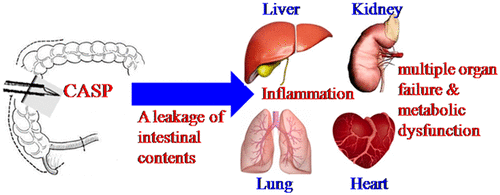当前位置:
X-MOL 学术
›
J. Proteome Res.
›
论文详情
Our official English website, www.x-mol.net, welcomes your feedback! (Note: you will need to create a separate account there.)
Colon Ascendens Stent Peritonitis (CASP) Induces Excessive Inflammation and Systemic Metabolic Dysfunction in a Septic Rat Model
Journal of Proteome Research ( IF 4.4 ) Pub Date : 2017-12-15 00:00:00 , DOI: 10.1021/acs.jproteome.7b00730 Limin Zhang 1 , Yuan Tian 1 , Jianfen Yang 2 , Jieshou Li 2 , Huiru Tang 3 , Yulan Wang 1, 4
Journal of Proteome Research ( IF 4.4 ) Pub Date : 2017-12-15 00:00:00 , DOI: 10.1021/acs.jproteome.7b00730 Limin Zhang 1 , Yuan Tian 1 , Jianfen Yang 2 , Jieshou Li 2 , Huiru Tang 3 , Yulan Wang 1, 4
Affiliation

|
The colon ascendens stent peritonitis (CASP) surgery induces a leakage of gut contents, causing polymicrobial sepsis related to post-operative multiple organ failure and death in surgical patient. To evaluate the effects of CASP on multiple organs, we analyzed the systemic metabolic consequences in liver, kidney, lung, and heart of rats after CASP by employing a combination of metabolomics, clinical chemistry, and biological assays. We found that CASP surgery after 18 h resulted in striking elevations of lipid, amino acids, acetate, choline, PC, and GPC in rat liver together with significant depletion of glucose and glycogen. Marked elevations of organic acids including lactate, acetate, and creatine and amino acids accompanied by decline of glucose, betaine, TMAO, choline metabolites (PC and GPC) nucleotides, and a range of organic osmolytes such as myo-inositol are observed in the kidney of 18 h post-operative rat. Furthermore, 18 h post-operative rats exhibited accumulations of lipid, amino acids, and depletions of taurine, myo-inositol, choline, PC, and GPC and some nucleotides including uridine, inosine, and adenosine in the lung. In addition, significant elevations of some amino acids, uracil, betaine, and choline metabolites, together with depletion of inosine-5′-monophosphate, were only observed in the heart of 18 h post-operative rats. These results provide new insights into pathological consequences of CASP surgery, which are important for timely prognosis of sepsis.
中文翻译:

结肠升空性支架腹膜炎(CASP)诱发脓毒症大鼠模型中的过度炎症和全身代谢功能障碍。
结肠提升支架腹膜炎(CASP)手术会引起肠道内容物的泄漏,从而导致与手术后患者多器官功能衰竭和死亡相关的多发性败血症。为了评估CASP对多个器官的影响,我们通过组合代谢组学,临床化学和生物学分析,分析了CASP后大鼠肝脏,肾脏,肺和心脏的全身代谢后果。我们发现18小时后的CASP手术导致大鼠肝脏脂质,氨基酸,乙酸盐,胆碱,PC和GPC显着升高,同时葡萄糖和糖原也大量消耗。有机酸(包括乳酸,乙酸盐,肌酸和氨基酸)显着升高,并伴有葡萄糖,甜菜碱,TMAO,胆碱代谢物(PC和GPC)核苷酸的下降,肌肌醇在18小时的术后大鼠肾观察。此外,18小时后的大鼠手术表现出脂质,氨基酸,和牛磺酸的耗竭,的累积肌肌醇,胆碱,PC,和GPC和一些核苷酸,包括尿苷,肌苷和腺苷在肺中。另外,仅在术后18小时的心脏中观察到某些氨基酸,尿嘧啶,甜菜碱和胆碱代谢物的显着升高,以及肌苷5'-单磷酸的消耗。这些结果提供了对CASP手术病理后果的新见解,这对于脓毒症的及时预后很重要。
更新日期:2017-12-15
中文翻译:

结肠升空性支架腹膜炎(CASP)诱发脓毒症大鼠模型中的过度炎症和全身代谢功能障碍。
结肠提升支架腹膜炎(CASP)手术会引起肠道内容物的泄漏,从而导致与手术后患者多器官功能衰竭和死亡相关的多发性败血症。为了评估CASP对多个器官的影响,我们通过组合代谢组学,临床化学和生物学分析,分析了CASP后大鼠肝脏,肾脏,肺和心脏的全身代谢后果。我们发现18小时后的CASP手术导致大鼠肝脏脂质,氨基酸,乙酸盐,胆碱,PC和GPC显着升高,同时葡萄糖和糖原也大量消耗。有机酸(包括乳酸,乙酸盐,肌酸和氨基酸)显着升高,并伴有葡萄糖,甜菜碱,TMAO,胆碱代谢物(PC和GPC)核苷酸的下降,肌肌醇在18小时的术后大鼠肾观察。此外,18小时后的大鼠手术表现出脂质,氨基酸,和牛磺酸的耗竭,的累积肌肌醇,胆碱,PC,和GPC和一些核苷酸,包括尿苷,肌苷和腺苷在肺中。另外,仅在术后18小时的心脏中观察到某些氨基酸,尿嘧啶,甜菜碱和胆碱代谢物的显着升高,以及肌苷5'-单磷酸的消耗。这些结果提供了对CASP手术病理后果的新见解,这对于脓毒症的及时预后很重要。


























 京公网安备 11010802027423号
京公网安备 11010802027423号